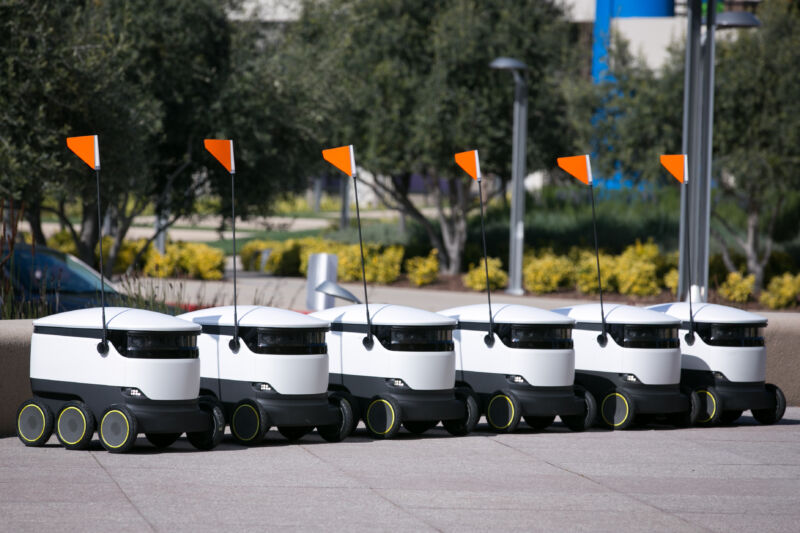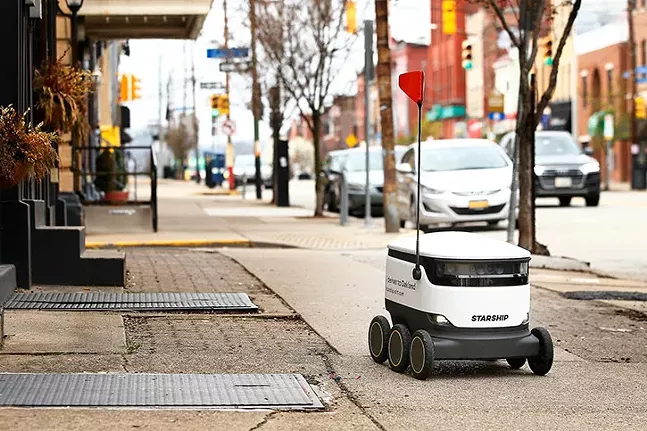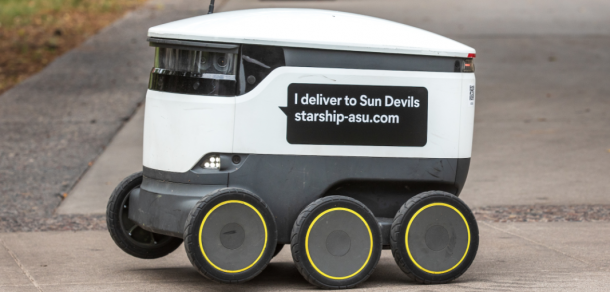Sidewalk-robot startup celebrates 1 million deliveries
Low speeds enabled Starship to launch its service safely and quickly

Last March, just as the Washington, DC, area was locking down for COVID-19, I traveled to George Mason University in Fairfax, Virginia, to eat a hamburger delivered by a robot.
The robot was owned by delivery startup Starship. Today, Starship announced that it has completed 1 million deliveries. Annika Keeton, a college student in Bowling Green, Ohio, was Starship's millionth customer.
In recent years, a lot of hype has followed companies like Waymo and Tesla as they try to build full-size, go-anywhere self-driving cars. But designing these vehicles has proven fiendishly difficult. Tesla's self-driving software still requires careful supervision, while Waymo's driverless taxis are still limited to one corner of the Phoenix metropolitan area.
Starship chose to tackle a much easier technical challenge. Its vehicles never go faster than four miles per hour (6.4km/h), dramatically reducing safety concerns. Starship has focused on offering service on college campuses, a relatively controlled and forgiving environment for autonomous robots. As a result, Starship was able to launch commercially a few years ago and expand rapidly.
The company reached 100,000 deliveries in August 2019 and 500,000 deliveries in June 2020. It expects to complete another million deliveries in a matter of months.
Obviously, Starship isn't an immediate threat to Waymo. But self-driving startups exist on a spectrum between Starship and Waymo. There are several startups—including Nuro, Udelv, and Gatik—working on driverless delivery services on roads rather than sidewalks . . .
There are also a number of startups working on driverless taxi and shuttle services that operate at low speeds in limited areas. Voyage is building a driverless taxi service at a large retirement community in Florida where the top speed is 25mph. Optimus Ride partners with large commercial landlords to provide shuttle services in planned communities. May Mobility is running a self-driving shuttle service in Grand Rapids, Michigan.
Obviously, if Waymo can get its full-speed self-driving technology working at scale, it can easily enter these narrower markets. But if it takes time for Waymo (and other high-end robotaxi companies like Cruise, Argo, and Zoox) to scale up—for logistical, technical, or regulatory reasons—that will leave an opening for more targeted services to grab market share. And once these startups are operating at a large scale, they may be able to improve their technology to handle higher speeds and more demanding situations, allowing them to more directly challenge companies higher on the self-driving food chain."
Here's one promoted comment from the story to give you a good idea of a reaction -
dan185818 Smack-Fu Master, in training
Another person asked about getting into them. You have to have your phone with you to pick up, with GPS on, before the top unlocks (at least it did the one time I've had drinks ordered).
That said, they're also very cute. That helps incredibly with dealing with the inconveniences they might have. And very polite, if they see a person near them in front, they stop and let you go. One of the places that put food in them is in the building I work(ed before work from home because of the pandemic) in, so there would be a line of 6-8 of them outside, like pets.
The first Halloween that these were on campus, we saw a LOT of really good costumes of them, too. They've caused very little issue, and have helped in a lot of ways, I think."
-------------------------------------------------------------------------------------------------------------------------------
RELATED CONTENT:
The pandemic is bringing us closer to our robot takeout future
“We saw that business double overnight,” startup says of UK grocery deliveries.
-----------------------------------------------------------------------------------------------------------------------
FURTHER READING: About 11,400 results Search Results
December 2020 Pittsburgh PA
Pennsylvania legalizes autonomous delivery robots, classifies them as pedestrians
CP Photo: Jared Wickerham
Last month, Pennsylvania legalized autonomous delivery robots, which can weigh up to 550 pounds without cargo and typically roam sidewalks to delivery goods in urban and suburban environments.
The law’s passage went largely unnoticed, and it became law without Gov. Tom Wolf’s signature. It passed mainly along partisan lines, with Republicans supporting the law and Democrats opposing, calling it a job killer. Bills regulating autonomous delivery robots have largely been pushed by delivery companies like Amazon and FedEx, according to WIRED magazine. Opposition has largely come from pedestrian and accessibility advocates, as well as labor unions like the Teamsters. . . Pennsylvania joins several other states in regulating autonomous delivery robots, aka Personal Delivery Devices (PDD). Most laws, including Pennsylvania’s, now legally classify them as pedestrians, as long as PDDs yield the right-of-way to actual human pedestrians and cyclists.
-------------------------------------------------------------------------------------------------------------------------------
More >
Arizona State deploys Starship robot delivery
11 September, 2020
Arizona State University is the latest institution to turn to robot delivery from Starship, with a fleet of 40 autonomous robots being deployed on the Tempe campus. Assisting in the initiative is ASU’s food-service provider, Aramark, who has partnered with delivery robot provider Starship Technologies to provide the program to higher education institutions.
According to an official university release, the fleet of 40 robots will serve ASU’s on-campus community and will deliver from select group campus dining locations to start with the hopes to expand the program over the academic year. ASU students, faculty and staff can all leverage the Starship mobile app to place their food and drink orders, and select on-campus locations where the robots will place deliveries
ASU joins a growing roster of campuses across the country to deploy Starship delivery robots on campus, including Purdue University, Georgia Southern University, Ole Miss, the University of Houston, and more.
To get started, ASU students open the Starship Deliveries app, choose the food items they want, then drop a pin on the map in the mobile app to designate where they want the delivery to be sent. The user can then watch as the robot makes its journey to them via the interactive map. Once the robot arrives at its destination, a push notification is sent to the user to meet and unlock the robot through the app.
More > Starship delivery robots bring Starbucks, Blaze pizza to campus




No comments:
Post a Comment